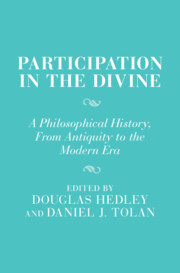Book contents
- Participation in the Divine
- Cambridge Studies in Religion and Platonism
- Participation in the Divine
- Copyright page
- Contents
- Contributors
- Foreword
- Acknowledgements
- Introduction
- 1 The Lord Is One
- 2 The Place and Scope of Participation in the Divine in the Thought of Plato
- 3 Origen on Participation
- 4 Forms, Intellects, and Angels
- 5 Participation in the Divine in Gregory of Nyssa
- 6 Augustine’s “Illumination” Theory as the Natural Participation of the Human Mind
- 7 The Principle of Cosmic Unification in the Athenian School of Platonism
- 8 St. Maximus the Confessor on Participation
- 9 Participation in Medieval Platonism
- 10 Participation as God’s Indwelling
- 11 Some Late Medieval Discussions of Participation in the Divine
- 12 Music, Temperance, and Participation in Marsilio Ficino
- 13 Richard Hooker’s Metaphysics of Divine Participation
- 14 The Transcendence of Holiness
- 15 Ralph Cudworth on Causality and Substantial Forms
- 16 The Romantic Legacy
- 17 Participation Revived and Revised
- Index
- References
6 - Augustine’s “Illumination” Theory as the Natural Participation of the Human Mind
Correcting Bonaventure and Gilson via Plotinus and Marius Victorinus
Published online by Cambridge University Press: 23 November 2024
- Participation in the Divine
- Cambridge Studies in Religion and Platonism
- Participation in the Divine
- Copyright page
- Contents
- Contributors
- Foreword
- Acknowledgements
- Introduction
- 1 The Lord Is One
- 2 The Place and Scope of Participation in the Divine in the Thought of Plato
- 3 Origen on Participation
- 4 Forms, Intellects, and Angels
- 5 Participation in the Divine in Gregory of Nyssa
- 6 Augustine’s “Illumination” Theory as the Natural Participation of the Human Mind
- 7 The Principle of Cosmic Unification in the Athenian School of Platonism
- 8 St. Maximus the Confessor on Participation
- 9 Participation in Medieval Platonism
- 10 Participation as God’s Indwelling
- 11 Some Late Medieval Discussions of Participation in the Divine
- 12 Music, Temperance, and Participation in Marsilio Ficino
- 13 Richard Hooker’s Metaphysics of Divine Participation
- 14 The Transcendence of Holiness
- 15 Ralph Cudworth on Causality and Substantial Forms
- 16 The Romantic Legacy
- 17 Participation Revived and Revised
- Index
- References
Summary
In this chapter, I show that Augustine’s “divine illumination theory of knowledge” is merely his belief that the human mind is capable of intellectual cognition because it naturally “participates” in the Divine Mind, as its image. Consequently, the claim that Augustine thought the human mind must be enlightened by special divine assistance in ordinary (nonmystical) intellectual cognition is erroneous. That is true of the whole of his writing career: earlier works such as On the Teacher and the Confessions agree with his presentation in On the Trinity 12. This resolution of a long-standing debate about how to interpret Augustine becomes possible when we pay careful attention to the ancient philosophical problems “illumination” is meant to resolve, and when we use Plotinus and the early Christian Neoplatonist Marius Victorinus to interpret his vocabulary and claims. The recovery of this late ancient context greatly clarifies Augustine’s epistemological theory and reveals its explanatory power.
- Type
- Chapter
- Information
- Participation in the DivineA Philosophical History, From Antiquity to the Modern Era, pp. 128 - 161Publisher: Cambridge University PressPrint publication year: 2024

